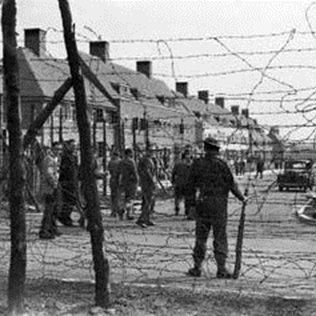“He who has a why to live for can bear almost any how.”
– Friedrich Nietzsche
If you’ve never had the chance to read Viktor Frankl’s Man’s Search for Meaning, it’s time that this best-selling book finds its way onto your reading list. It may not change your life, but it will certainly give you a new lens through which to view it.
Frankl was an Austrian neurologist and psychiatrist who was transported and processed at the Auschwitz concentration camp in October 1944 alongside his wife. He survived months of slave labor at a camp affiliated with Dachau before his liberation by American soldiers the following year. Sadly, his mother Elsa and brother Walter died in Auschwitz; his wife Tilly died in Bergen-Belsen.
How does someone find meaning in such dire circumstances?
 Confinement in the camps bought harsh working conditions, insufficient nourishment, lack of sleep, and a host of psychological pressures. Yet through it all, there were prisoners who devoted their energies to comforting others and sharing their meager scraps of food. They’d lost everything, but they retained the ability to choose how they’d respond to their circumstances. They exercised control over their mental and spiritual well-being.
Confinement in the camps bought harsh working conditions, insufficient nourishment, lack of sleep, and a host of psychological pressures. Yet through it all, there were prisoners who devoted their energies to comforting others and sharing their meager scraps of food. They’d lost everything, but they retained the ability to choose how they’d respond to their circumstances. They exercised control over their mental and spiritual well-being.
“When we are no longer able to change a situation,… we are challenged to change ourselves.”
– Viktor Frankel
Pain and suffering find a way into every person’s life. How we face these challenges determines the quality of our character. The extreme conditions in the camps forced the prisoners to adjust their core attitudes toward life. They stopped asking life what it would do for them; they started asking what life expected of them.
Each of us comes into this life with a purpose to be served. Our distinctiveness has a bearing on the work that we’ll do as well as the lives we’ll touch. If we accept these responsibilities, we can learn to bear almost any hardship. This awareness gives us a sense for the unfinished (or unrealized) work that awaits completion through our efforts. It helps us see the faces of loved ones whose happiness and well-being demand our presence and participation in their lives. No other person can walk in our footsteps; no one can be replaced. As Frankl says:
“Being human always points, and is directed, to something, or someone, other than oneself – be it a meaning to fulfill or another human being to encounter. The more one forgets oneself – by giving himself a cause to serve or another person to love – the more human he is and the more he actualizes himself.”
To that end, Frankl cautions against aiming at success. The more we set our sights on it, the less likely we’ll attain it. Success ensues as an unintended side effect of dedication to a cause greater than oneself. He asks us to listen to our conscience and carry out its directives to the best of our ability.
I’ve certainly never experienced any trauma or tragedy comparable to the Holocaust. Yet I draw comfort and inspiration from Frankl’s words at a time when our country seems to be in such turmoil and armed conflicts abound. Even Mother Nature seems to be lashing out in response to our questionable stewardship of her bounty. It’s easy enough to feel discouraged. Here again, Frankl cuts through all the noise with a clear and compelling message:
“For the world is in a bad state, but everything will become worse unless each of us does his best.”
– Viktor Frankel
Seriously – read the book!